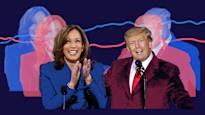In the US, most voters don’t care that much, but the fight over the electors is very fierce, writes ‘s foreign correspondent Mika Mäkeläinen.
Mika Mäkeläinen, foreign journalist
This week, the US presidential election campaign has been in such a backwater phase that the candidates have not changed, they have not argued with each other on TV – and there have been no attempts to shoot them.
Still, it’s boiling under the surface. The campaign is mercilessly hot and very even for every electoral vote in the division.
That is, specifically from the votes of the electors and not from the votes of the voters. In most states, the ballot of ordinary voters does not really matter much in terms of the outcome.
It’s because of the election method: Almost without exception, all the electors in the state go to the person who takes the majority of the votes.
It is already known with great certainty that in the vast majority of states, a clear majority of voters are leaning towards either Horrible Harris or Donald Trump’s in the direction of. In them, the election campaign is slow, because neither of them should sacrifice money or time to reverse the election results that seem certain.
That’s why popularity polls covering the entire country are irrelevant and the result should not be predicted based on them.
All attention is focused on the so-called Libra states, of which there currently appear to be seven—Nevada, Arizona, Georgia, Wisconsin, Michigan, Pennsylvania, and North Carolina. 270 voters are needed for victory.
In all states of the scale, the struggle is so even that the differences in the support of the candidates fit within the polls’ margin of error. So the end result can be anything.
The battle for Nebraska’s one vote
The unrelenting fight for every elector has led to the fact that, in addition to the actual Libra states, even of the one and only Nebraska elector.
Nebraska and Maine are about it deviant statesthat in them the winner does not automatically get all the electors of the state behind him. In Nebraska, five electors are distributed – two for the state winner and three for the winners of different electoral districts.
Trump is projected to win a majority of Nebraskans’ votes and four electoral votes, but Harris will win the majority in the urban district that includes Omaha, the state’s largest city. If that were to happen, Harris would gain one elector from the middle of the carpet of red, or Republican, states on the prairie. So even one city could decide the election.
Barack Obama won that electoral district in 2008, the Democratic Party’s first electoral vote in Nebraska in more than 40 years.
Trump’s campaign tried at the last minute to get Nebraska to change the rules of the election so that the winner of the state would get all the electors, but the attempt failed.
The opposite situation is in Maine, where Trump may win one voter of the electoral district, even though the entire rest of the New England region is blue on the support maps, i.e. the Democratic majority region.
Own finances are the most important voting criteria
When the struggle is so extremely even, with what fins will the election be won in the end?
The electoral wisdom tested in the United States is that the voters’ perception of the state of their own economy decides the choice of a candidate. Is it better or worse now than four years ago? Which of the candidates seems better from an economic point of view?
Trump has traditionally been trusted more when it comes to finances. However, the situation is became more equal. Trump’s lead over Harris is no longer large.
When Trump’s counter-candidate was still a sitting president Joe BidenTrump’s lead as the most popular economic candidate was around 12 percentage points based on polls collected by The Washington Post.
After the Democratic candidate switched to Harris, the gap has narrowed to six percentage points.
According to the Morning Consult company, the candidates would already be financially sound even.
According to a survey by the University of Michigan consumer confidence in the economy is improving, and Harris could even be on top of his economic reputation.
Vice President Harris will benefit if consumers feel their economic situation is better than before. Falling interest rates in the US are improving consumer confidence that they can manage their loans and that inflation is coming under control.
The differences between the candidates in foreign policy are of course large and important for Europe, but that doesn’t really bother the average American. Right now, the candidates are talking about ending Russia’s war of aggression.
Then, when the president of Ukraine Volodymyr Zelenskyi has left for his trip home, the candidates are focusing on the economy in their campaign and are specifically touring the states of the Western Hemisphere. Even in them, the majority of voters have already chosen their candidate, so the competition for votes is aimed at a very small part of the country’s eligible voters.
And if the final result is very even, they may not have the last word either – accusations of problems with the vote count start to be thrown around, and the election result may eventually have to be decided in court.
